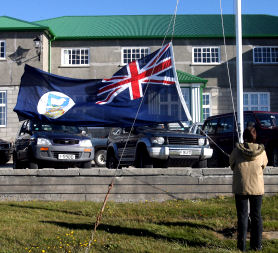Rig arrives amid growing Falklands oil dispute
Updated on 19 February 2010
Channel 4 News exclusive: despite protests from Argentina, an oil rig has arrived on site in the north Falklands basin, where it will start exploratory drilling next week. John Sparks reports.

It is believed to have enough oil reserves to pay off the national debt. But exploiting the field in the South Atlantic has the potential to reopen the sovereignty row which sparked the Falklands war.
Tonight, despite protests from Argentina, the first of the oil rigs has arrived on site.
Pulled by tugboats, the Ocean Guardian left Scotland three months ago before making the journey south to the Falklands.
The archipelago is situated 500 miles off the coast of South America. The rig now sits in the north Falklands basin, one of three areas around the islands being examined by four oil companies.
For
more Channel 4 News coverage of the Falklands
- 5 Minute Guide: the Falklands
- Falklands are protected, says Brown
- Argentina escalates Falklands row
- Remembering the Falklands
- Interactive: battle for the Falklands
- You saw it happen: Falklands 1982
Britain said it had taken steps to protect the Falkland Islands amid an escalating dispute over the exploration for oil and gas in the South Atlantic, which geologists believe contain substantial energy reserves.
Argentina accused Britain yesterday of "whipping up the spectre of war" following Gordon Brown's insistence that the Falkland Islands were properly protected - nearly 30 years after the two countries went to war over control of the British-ruled islands.
The riches that lie below the water will serve only to intensify the arguments in London and Buenos Aires - and at the United Nations itself.
The drilling rig Ocean Guardian, contracted by British companies, arrived at its destination today with an aim to start work next week. Hundreds of pipes were piled up at the Port Stanley harbour yesterday, with a supply ship transporting drilling equipment out to the Ocean Guardian.
Once the rig is in position it will take 24 to 36 hours before starting exploratory drilling in the north Falklands basin. At that point, reported John Sparks for Channel 4 News, "they really will get a move-on because operating one of these things is expensive - about £200,000 a day."
He went on: "This wind-swept community (on the Falkland Islands) is now starting to feel like an oil town, although the island authorities warn against over-excitement."
Phyllis Rendell, the Falkland's director of mineral resources told Channel 4 News that it is "an exciting time for the Falkland Islands".
"We're at the same state now as those people who were drilling in the North Sea in the 1960s - we are hoping for the best."
According to geological surveys the Falkland Islands have the equivalent of 60 billion barrels of oil in total.

Argentina said earlier this month that it strongly opposed energy exploration
on its continental shelf.
"What they're doing is illegitimate...it's a violation of our sovereignty. We will do everything necessary to defend and preserve our rights," Foreign Minister Jorge Taiana said.
Mr Taiana is due to meet Secretary General Ban Ki-moon at the UN headquarters in New York next Wednesday to protest Britain's plans, a ministry source said.
Gordon Brown said international law allows UK firms to operate freely in the area - adding that he expected to resolve the dispute as soon as possible.
"It is perfectly within our rights to be able to do this. I think the Argentineans actually understand that," Brown said yesterday. "Sensible discussions will prevail on this."
Falklands veteran Tony Banks returned to the islands last month. He acknowledged to Krishnan Guru-Murthy that there were high expectations for the drilling operation.
He continued: "Ultimately the Falkland islanders live under daily threat from Argentina from a political and economical point of view.
He suggested there was "a political deal to be done with Argentina regarding the mineral rights in the Falkland Islands".
"But this really is down to them to give up their sovereignty right. I'm pretty sure the Falkland Islands would be happy to share their wealth with their neighbours if they can lift this continual threat of political and economical hindrance to the islands' operating."
"It's imperative that the politicians and diplomats get their act together to come to some form of agreement that's acceptable to all nations to allow this very, very wealthy area of the ocean to be developed."
In 1982, Britain sent a naval force and thousands of troops to reclaim the islands after Argentine forces occupied them. About 650 Argentine and 255 British troops were killed in the 10-week conflict.
Britain has a permanent military presence on the islands, which are called Las Malvinas in Argentina, and maintains a force of 1,076 troops and four ships in the region.
The Ministry of Defence has denied reports that it was sending more ships to the Falklands over the current dispute.
"The government is fully committed to the South Atlantic Overseas Territories, which include the Falkland Islands," it said. "A deterrence force is maintained on the islands."



